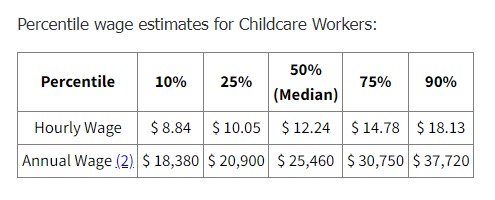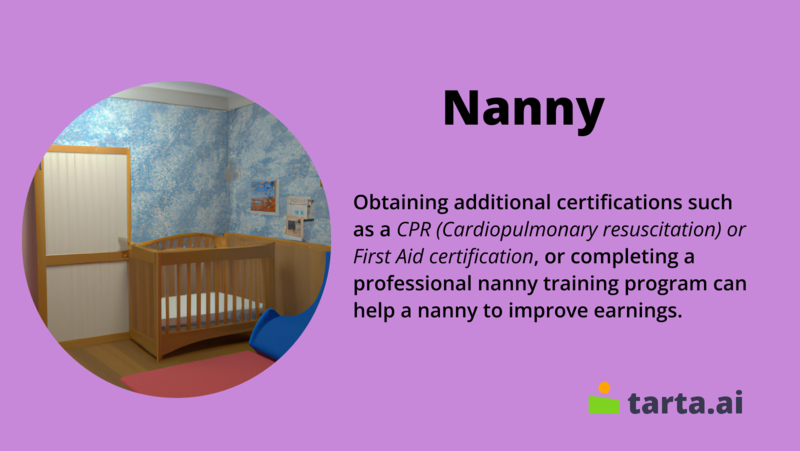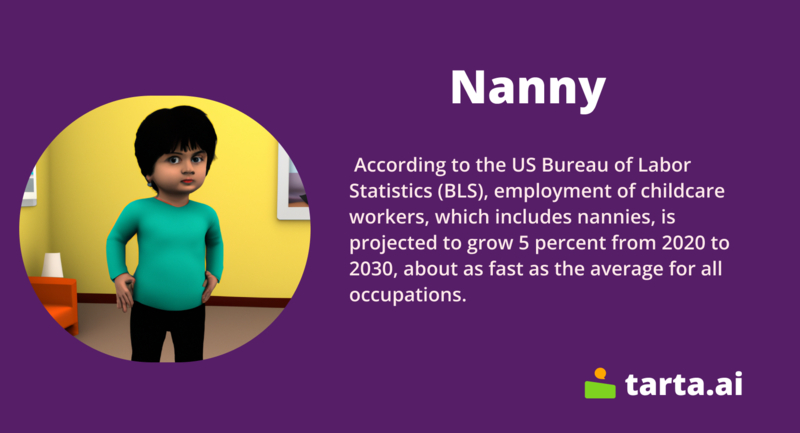Working As A Nanny: A Deep Look Into The Career Perspectives

Nannies are hired to provide in-home care for children. They are usually employed by families who require assistance with child care due to work or other commitments. Nannies can be of any gender, age, and background, and may work full-time, part-time, or on an as-needed basis.
Nannies can have a range of qualifications and experience, including formal education in child development or early childhood education, experience working with children, and certifications in CPR and first aid. Nannies are responsible for ensuring the safety, well-being, and development of the children under their care, and may also be responsible for light housekeeping and other household duties related to child care.
Requirements
The requirements to become a nanny can vary depending on the specific job and the employer's preferences, but here are some common requirements:
- Age and legal status: Nannies must be at least 18 years old and legally authorized to work in the country where the job is located.
- Education and experience: Some families may prefer a nanny with a degree or certification in child development, early childhood education, or a related field. Other families may prioritize experience working with children, either as a nanny or in another childcare role.
- Background check: Most families will require a background check to ensure the nanny does not have a criminal history or other red flags that could indicate a risk to the children's safety.
- References: Families may request references from previous employers or individuals who can vouch for the nanny's character, reliability, and suitability for the job.
- CPR and first aid certification: Some families may require nannies to have current certifications in CPR and first aid to ensure they can respond appropriately in case of an emergency.
- Language and communication skills: Depending on the family's needs, nannies may need to be fluent in a specific language or able to communicate effectively with children who have language delays or other communication challenges.
- Driver's license and clean driving record: Some families may require nannies to have a driver's license and a clean driving record in order to transport children to and from activities or appointments.

PHOTO: GETTY IMAGES
Responsibilities
As a nanny, your main responsibility is to provide in-home care for children and ensure their safety, well-being, and development. Some of the main responsibilities of a nanny may include:
- Child care: This includes feeding, bathing, dressing, and supervising children, as well as providing age-appropriate activities and playtime.
- Transportation: Depending on the family's needs, nannies may be responsible for transporting children to and from school, activities, or appointments.
- Light housekeeping: Nannies may be responsible for tasks related to child care, such as doing children's laundry, cleaning up after meals and playtime, and keeping children's areas tidy.
- Communication with parents: Nannies should be able to communicate regularly with parents about the children's activities, progress, and any concerns or issues that arise.
Additional responsibilities of a nanny may vary depending on the specific family's needs, but may include:
- Tutoring or homework help: Nannies may be asked to assist children with their homework or provide additional educational support.
- Meal preparation: Nannies may be responsible for preparing meals and snacks for children.
- Errands and shopping: Nannies may be asked to run errands or do shopping related to child care, such as buying diapers or picking up groceries.
- Travel: Some families may require nannies to travel with them for extended periods, either domestically or internationally.
As a nanny, it is important to be flexible and adaptable to the family's needs, and to prioritize the safety and well-being of the children under your care.
Skills
As a nanny, it is important to possess a wide range of skills and qualities in order to provide the best care possible for the children under your supervision. From patience and communication to safety awareness and creativity, nannies play a vital role in ensuring the well-being and development of children. In this table, we will explore some of the essential skills that are needed to work as a nanny, along with an explanation of why each skill is important. By understanding these skills, aspiring nannies can better prepare themselves for this fulfilling and rewarding career path.
Skill | Why it's important |
Patience | Children can be unpredictable and may require a lot of attention and guidance. A patient nanny is better able to handle challenging situations and provide a calm and positive environment for the children. |
Communication | Effective communication with both children and parents is essential for a successful nanny-child-parent relationship. Nannies must be able to listen carefully to children's needs and concerns, as well as communicate regularly and clearly with parents about the children's progress, behavior, and any issues that arise. |
Flexibility | Nannies must be able to adapt to changing schedules, routines, and situations. They should be able to think creatively and quickly problem-solve when unexpected situations arise. |
Organizational skills | Nannies may be responsible for managing multiple schedules, coordinating activities, and keeping track of children's needs and preferences. Strong organizational skills are important to keep everything running smoothly. |
Creativity | Nannies should be able to come up with fun and engaging activities and playtime for children, as well as find ways to help children learn and develop new skills. |
Safety awareness | Nannies must be vigilant about safety, particularly for younger children who may require more supervision. They should be able to identify potential hazards and take appropriate steps to prevent accidents. |
Empathy | Nannies should be able to relate to children on their level and understand their emotions and needs. Showing empathy and compassion helps build trust and a positive relationship with the children. |
First aid and CPR certification | Nannies should have current certifications in first aid and CPR to ensure they can respond appropriately in case of an emergency. |
Salary
The salary for nannies in the US can vary depending on a number of factors, including location, experience, education, and job responsibilities. According to data from the Bureau of Labor Statistics, the median hourly wage for childcare workers, which includes nannies, was $12.87 as of May 2020. However, it is important to note that this figure can range from minimum wage to over $20 per hour depending on the individual job and employer. Additionally, some nannies may receive benefits such as health insurance, paid time off, and travel expenses, which can also impact their overall compensation. It is important for nannies to discuss compensation and benefits with their employers before accepting a job offer to ensure that they are being fairly compensated for their work.

www.bls.gov
Average salary per year
According to data from the Bureau of Labor Statistics, the median annual wage for childcare workers, which includes nannies, was $26,790 as of May 2020. Some nannies may earn a higher salary due to their qualifications, experience, and additional job requirements, such as traveling with the family or performing other household tasks. On the other hand, some nannies may earn a lower salary if they work part-time or have less experience. It's important for nannies to discuss compensation with potential employers and negotiate a fair salary based on their qualifications and job responsibilities.
Here are the states with the highest average annual salaries for nannies in the US, based on data from the Bureau of Labor Statistics:
State | Average Annual Salary for Childcare Workers (including nannies) |
Massachusetts | $32,480 |
Alaska | $31,800 |
New York | $31,730 |
District of Columbia | $31,230 |
California | $30,910 |
Factors that influence the earnings
As with any profession, a nanny's salary can be influenced by a variety of factors, from location and experience to job responsibilities and negotiation skills. Understanding these factors can help nannies better prepare themselves for discussions around salary and compensation with potential employers. We will explore some of the key factors that can impact a nanny's salary, including location, experience and qualifications, job responsibilities, schedule and hours, and negotiation skills. By understanding these factors, nannies can gain insight into how their compensation is determined and how they can negotiate a fair salary that reflects their skills and expertise.
The salary for nannies can be influenced by a number of factors, including:
- Location: The cost of living can vary widely between different cities and states, which can impact the salary that nannies can command. For example, nannies working in major cities may be able to earn a higher salary due to the higher cost of living and demand for childcare services.
- Experience and qualifications: Nannies with more experience or specialized skills may be able to command a higher salary. For example, nannies with training in early childhood education or specialized skills such as fluency in a second language may be able to earn more.
- Job responsibilities: The specific job responsibilities required of the nanny can also impact their salary. Nannies who are responsible for additional duties such as cooking, cleaning, or transportation may be able to command a higher salary than those who are solely responsible for childcare.
- Schedule and hours: Nannies who work full-time or have flexible schedules may be able to command a higher salary than those who work part-time or have less flexible schedules.
- Negotiation skills: Nannies who are able to effectively negotiate their salary and benefits may be able to command a higher salary than those who accept the first offer that is presented to them. It's important for nannies to research salaries in their local area and be prepared to discuss compensation with potential employers in order to ensure that they are being fairly compensated for their work.
Ways to improve earnings
- Furthering their education: Nannies with additional education or training in early childhood education or related fields may be able to command a higher salary.
- Building their experience: Nannies who have a track record of providing high-quality care and have experience working with children of different ages and backgrounds may be able to earn a higher salary.
- Obtaining specialized skills: Nannies with specialized skills such as fluency in a second language or experience working with children with special needs may be able to command a higher salary.
- Negotiating salary and benefits: Nannies who are able to effectively negotiate their salary and benefits may be able to earn a higher salary than those who accept the first offer that is presented to them.
- Taking on additional responsibilities: Nannies who are willing and able to take on additional responsibilities such as cooking, cleaning, or transportation may be able to earn a higher salary than those who are solely responsible for childcare.
- Working for high-paying employers: Nannies who work for high-paying employers such as celebrities or executives may be able to earn a higher salary due to the increased demand and prestige associated with these positions.
It's important for nannies to research salaries in their local area and be prepared to discuss compensation with potential employers in order to ensure that they are being fairly compensated for their work. By taking steps to improve their skills, experience, and negotiation abilities, nannies can increase their earnings and build a successful career in childcare.

Additional benefits
Working as a nanny can be a highly rewarding and fulfilling career choice for those who have a passion for working with children. In addition to the personal satisfaction that comes from helping children grow and develop, nannies can also enjoy a range of additional benefits that come with the job. From flexible schedules to the opportunity for long-term employment, working as a nanny offers a unique work experience that can be tailored to the needs and preferences of the individual. Here we will explore some of the additional benefits of working as a nanny, highlighting the unique opportunities and advantages that come with this profession.
- Flexible schedules: Many nanny positions offer flexible schedules, which can be ideal for those who need to balance work with other commitments such as school or family.
- Personalized work environment: Unlike working in a daycare or school setting, nannies typically work in the family's home, which can provide a more personalized and comfortable work environment.
- Close relationships with children: Nannies often have the opportunity to build close relationships with the children they care for, which can be incredibly rewarding and fulfilling.
- Opportunity to travel: Some nannies have the opportunity to travel with the family they work for, which can provide an exciting and unique work experience.
- Potential for long-term employment: Nanny positions can often lead to long-term employment, providing stability and job security for those in the field.
Overall, working as a nanny can be a fulfilling and rewarding career choice for those who enjoy working with children and are looking for a flexible and personalized work environment.
Fact
One in 10 nannies live with the family they care for

PHOTO: GETTY IMAGES
Job environment
Job Environment | Tools | Settings |
Indoor/outdoor | Toys and games | Private homes |
Highly interactive | Strollers and car seats | Parks and playgrounds |
Emotionally demanding | Children's books | Libraries |
Physically demanding | First aid kits | Schools |
Potentially noisy | Music players | Extracurricular activities |
Multitasking | Art supplies | Museums |
Attention to detail | Household cleaning supplies | Zoos and aquariums |
Nannies work in a variety of settings, from private homes to parks, libraries, schools, and more. They typically use a range of tools and equipment to help them provide care for the children they work with, including toys and games, strollers and car seats, children's books, first aid kits, music players, art supplies, and household cleaning supplies. The job environment for nannies is highly interactive and emotionally and physically demanding, requiring multitasking skills and attention to detail. The settings that nannies work in can be potentially noisy, and nannies must be able to adapt to a range of environments to provide the best possible care for the children in their charge.
Work schedule
The work schedule for nannies can vary depending on the family's needs and the age of the children they care for. Typically, nannies work full-time hours, which can range from 40-60 hours per week. However, some families may require part-time or occasional care, such as after-school care or date night babysitting.
Nannies often work flexible schedules, which can include early mornings, late evenings, and weekends. Some nannies may work overnight shifts or travel with the family they work for. In some cases, nannies may work split shifts, such as working in the morning and then again in the afternoon/evening.
It's important to note that while nannies may have a set schedule, the nature of the job can require flexibility and willingness to adjust the schedule based on the family's needs. Nannies may also be required to work overtime or be on call for emergencies. Overall, the work schedule for nannies can vary greatly depending on the specific job and family they work for.

PHOTO: GETTY IMAGES
Ways of career development
Nannying is a challenging yet rewarding career that requires a unique set of skills and expertise. As with any profession, nannies may seek ways to develop their careers and advance in the field. There are several strategies that nannies can utilize to improve their skills, increase their marketability, and command higher salaries. By continuing their education, specializing in certain areas, networking, seeking career advancement, and joining professional organizations, nannies can achieve their career goals and build a successful and fulfilling career in the child care industry. In this message, we will explore some of the ways that nannies can develop their careers and achieve professional growth.
- Continuing education: Nannies can take courses and workshops to improve their skills and knowledge. This can include courses in child development, nutrition, behavior management, and more.
- Specializing: Nannies can choose to specialize in a specific area of child care, such as newborn care, special needs care, or education-focused care. This can help them stand out in a competitive job market and command higher salaries.
- Networking: Nannies can connect with other professionals in the child care industry, such as other nannies, educators, and child care providers. This can lead to job referrals, professional development opportunities, and new job prospects.
- Career advancement: Nannies can seek out opportunities for career advancement, such as becoming a household manager, a family assistant, or a nanny for high-profile families. These positions often come with increased responsibilities and higher salaries.
- Joining professional organizations: Nannies can join professional organizations such as the International Nanny Association or the National Association for the Education of Young Children. These organizations provide access to resources, training opportunities, and networking events.
By continuing to develop their skills, specializing in a particular area, networking, seeking career advancement, and joining professional organizations, nannies can build fulfilling and rewarding careers in the childcare industry.
Here are also two tables outlining some of the subfields and specializations within the field of nannying:
Subfields within Nannying
Subfield | Description |
In-home childcare | Providing childcare services to families within their own homes |
Childcare centers | Working in a childcare facility or center with a group of children |
Providing care to children with physical or mental disabilities | |
Providing specialized care to newborns, including feeding, diapering, and sleep training | |
Educational-focused care | Providing educational support and assistance with homework and other learning activities |
Parent helper | Assisting parents with childcare and household tasks, such as cooking and cleaning |
Specializations within Nannying
Specialization | Description |
Special needs care | Providing care to children with specific needs, such as autism or Down syndrome |
Newborn care | Providing specialized care to newborns, including feeding, diapering, and sleep training |
Education-focused care | Providing educational support and assistance with homework and other learning activities |
Household management | Assisting with household tasks, such as cooking, cleaning, and laundry |
Travel nanny | Accompanying families on trips and providing childcare services while traveling |
It's important to note that these are just a few examples of the many subfields and specializations within the field of nannying. Each subfield and specialization requires a unique set of skills and expertise, and nannies may choose to specialize in one or more areas to better serve the families they work with.
Alternative Careers and Similar Jobs
Nannies possess a variety of skills that are valuable in many different industries. Here are some alternative careers and similar jobs for nannies:
- Childcare Center Director - Oversee the daily operations of a childcare center, including managing staff, budgeting, and ensuring compliance with licensing regulations.
- Early Childhood Educator - Teach young children in a variety of settings, such as preschools, Head Start programs, and daycare centers.
- Parent Educator - Provide education and support to parents, including topics such as child development, behavior management, and parenting techniques.
- Doula - Provide emotional and physical support to mothers before, during, and after childbirth.
- Family Social Worker - Assist families in need by providing counseling, support, and access to community resources.
- Household Manager - Manage household tasks such as cooking, cleaning, and organizing for families.
- Personal Assistant - Assist busy individuals with a variety of tasks, such as scheduling appointments, running errands, and managing personal finances.
- Personal Chef - Prepare meals for families in their homes, taking into account their dietary preferences and restrictions.
These are just a few examples of alternative careers and similar jobs for nannies. Each of these professions requires a unique set of skills and expertise, and nannies may find that their experience in childcare makes them well-suited for a variety of roles outside of nannying.
Did you know?
There is actually a difference between nannies and babysitters.
A nanny is a professional caregiver who typically works full-time for one family, providing ongoing childcare and household support.
In contrast, a babysitter is typically hired on an as-needed basis to provide short-term childcare while the parents are away. Babysitters may work for multiple families and may have different duties and responsibilities depending on the age of the child and the specific needs of the family.
Job Market
The job market for nannies in the US is generally favorable, with employment opportunities available in many different settings.

The demand for nannies can vary depending on factors such as location, economic conditions, and demographic trends. For example, areas with a high concentration of families with young children are likely to have more demand for nannies. Additionally, families with higher incomes may be more likely to hire nannies to provide personalized care for their children.
In general, the demand for nannies has been steadily increasing in recent years due to a number of factors, such as the rise of dual-income households, the increasing cost of childcare, and the need for more flexible and personalized care options.
Additionally, the COVID-19 pandemic has also had an impact on the demand for nannies. Many families have had to adjust their work schedules and childcare arrangements due to school closures and remote work, leading to an increased need for in-home care.
Overall, nannying can be a rewarding and stable career choice for individuals who are passionate about working with children and have the necessary skills and experience. It's important for nannies to keep their skills and qualifications up-to-date, as well as build a strong network and reputation within the industry to increase their job prospects.
Possibilities of a part-time job
Obviously, there is a possibility for nannies to work part-time. Many families require part-time nanny services due to their work schedules, budget constraints, or the age of their children. Part-time nanny positions can range from a few hours a week to a few days a week and can be structured in a variety of ways to meet the needs of both the family and the nanny.
Part-time nannies may be responsible for a range of duties, including picking up children from school or activities, supervising playtime, preparing meals, helping with homework, and putting children to bed. They may also be required to assist with light housekeeping tasks, such as laundry and tidying up.
It is important for families and nannies to communicate clearly about their expectations and work schedules to ensure a successful working relationship. Nannies who are interested in working part-time may want to consider registering with a nanny agency or job board that specializes in part-time positions, or network with other nannies and families in their area to find opportunities.
Fact
Seven out of ten nannies work full time
Job satisfaction
Job satisfaction for nannies can vary depending on a variety of factors, including the specific job duties, the work environment, the family they work for, and their own personal preferences and values. However, many nannies report high levels of job satisfaction due to the rewarding nature of their work and the close relationships they often develop with the children and families they care for.
The advantages of working as a nanny include:
- Building meaningful relationships with children and families
- Flexible work schedules and the ability to work part-time or full-time
- The opportunity to work in a home-based environment
- Competitive pay and benefits packages in some cases
- Opportunity for professional development and growth, such as attending workshops and conferences
Disadvantages of working as a nanny include:
- Lack of job security, as many nanny positions are dependent on the needs of the family
- Limited social interaction during working hours, as nannies may spend most of their time with children
- The potential for long hours, including evenings and weekends
- Emotional demands of working with children, including dealing with behavioral issues and providing emotional support
- The possibility of encountering difficult or challenging family dynamics
It is important for individuals considering a career as a nanny to carefully weigh the advantages and disadvantages and consider their own personal preferences and values before making a decision.
- The demand for nannies is increasing due to a variety of factors, including the rise of dual-income households, the increasing cost of childcare, and the need for more personalized and flexible care options.
- The COVID-19 pandemic has also had an impact on the demand for nannies, as families require in-home care due to school closures and remote work.
- Nannies who have specialized skills, such as knowledge of multiple languages or experience working with children with special needs, may have a competitive advantage in the job market.
- The job outlook for nannies may vary depending on the region and local economy.
- Nannies who prioritize building strong relationships with families, developing their skills through ongoing training, and maintaining a professional demeanor may have greater job security and opportunities for advancement.
FAQ
What qualifications do I need to work as a nanny?
No strict qualifications are required, but experience and references are preferred. CPR and first aid certification or early childhood education courses can be beneficia
What skills are most important for nannies to have?
Child development, nutrition and meal preparation, activity planning, behavior management, communication skills, patience, and the ability to work independently.
How much can I expect to earn as a nanny?
Nanny salaries vary depending on location, experience, and job responsibilities, but the median hourly wage in May 2020 was $12.75.
What kind of work schedule can I expect as a nanny?
Work schedules can vary widely depending on the family's needs, with some nannies working full-time, part-time, or on an as-needed basis. Non-traditional hours may be required.
What is the job outlook for nannies?
Demand for nannies is expected to continue to grow due to the rise of dual-income households and the need for personalized care options, although job outlook can vary by region and economy
What can I do to stand out in the competitive job market for nannies?
Prioritize building strong relationships with families, developing skills through ongoing training, and maintaining a professional demeanor. Specialized skills or experience can be beneficial